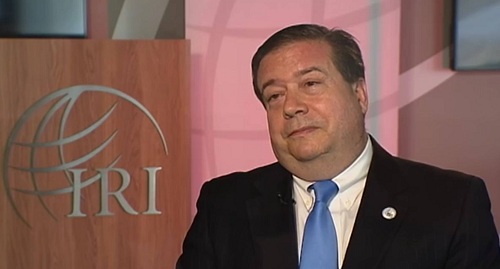
Stephen Nix, Eurasia Director at the International Republican Institute. Photo: VoA
Voice of America’s Nana Sajaia spoke about the upcoming municipal elections in Georgia with Stephen Nix, regional program director for Eurasia at the International Republican Institute.
Last week, you hosted the Georgian parliamentary delegation, after which president of IRI said you discussed upcoming local elections, how will you be involved in monitoring the elections?
We had very substantive discussion with the group. High level group, parliamentary leaders from both the Georgian Dream, as well as from the European Georgia. We talked about the upcoming elections and I advised the group IRI will be doing an election assessment of the local elections, not an actual election observation. In this case we do not have the funding to do a full blown election observation, we do a smaller effort and we won’t be issuing an official statement on the elections.
In countries through Eurasia you work with political parties and officials to create multiparty political systems. How is that effected by the ongoing constitutional amendments?
It was one of our main goals, right after the Rose Revolution and we told President Saakashvili this - now that the Rose Revolution has taken place there is new government in power, but IRI’s role and its mission is to build a competitive, multiparty political system and we work very hard towards that end, to try to encourage new parties and to help them in terms of technical assistance in training and we have helped create some viable political parties, and they have had some success in policy dialogue.
It is a work in progress and Georgia has shown demonstrative progress in democracy building, otherwise it would not be a signatory to an EU association agreement. But work remains to be done, and we will continue to work with current political parties. If politicians have a vision to create new political parties, we will certainly work with them as well, because we think this is the right thing to do, to continue to work and encourage people to get involved in the political process.
How do you evaluate the process in which constitutional amendments are taking place? For instance, President of Georgia has said, it has been a unilateral process led exclusively by the Georgian Dream party.
Georgia certainly has the right as a sovereign country to make changes to its constitution as it deems appropriate. Our only interest is seeing that processes are open and transparent and also inclusive. We are watching this process very closely, the process is ongoing. We are going to see how the Venice Commission recommendations take place and then look forward to see how the various political parties and parliament react to those suggestions.
According to IRI polls, 92% say president should be elected through direct popular election in Georgia. Why does the ruling party not consider this data?
I cannot speak for that particular political party. All I can say is that the opinion data seems to be very clear that the public would very much like to have direct elections of the president.
75 % of interviewees say they voted in 2014 local elections, while 63% say they will vote this fall. What contributes to this decrease?
Those are the polling questions, that is a projected turnout. I am not sure what turnout is going to be this election, we will have to wait and see. Our hope is that political parties will be actively campaigning, reaching out to voters, talking about issues that matter to voters on the local level, and that will generate a high level of turnout. That is what we are all hoping for.
Among voters’ favorable institutions - the parliament is only the 10th and local authorities the 12th. What contributes to such attitude?
Looking at the polling data it may be that people are not well informed on the duties and responsibilities of the Sakrebulos for example. And they need more information, so they can make informed choices. Our hope is that newly elected officials will reach out to the public and try to explain in greater detail what they intend to do in office, because I think there is a lack of information about what the roles and responsibilities are.
When asked which political party you would never vote for, 27% name Georgian Dream and 25% name United National Movement, and this amounts to more than a half of 100% of voting respondents. Are the needs of these voters addressed by any political party?
Those figures are interesting, but once been in power, you are judged accordingly and governments are always held accountable for their policies. Both of these parties have been in power, so it is a natural thing, I think, for voters to say ‘I am dissatisfied with this party, they have been in power, I am not seeing the results.’ That is the big part of democracy that if voters become dissatisfied with the political party, they are free to vote for an alternative, that is what we want to provide in Georgia – choices, alternatives.
The material was prepared for Civil.ge by the Voice of America. In order to license this and other content free of charge, please contact Adam Gartner.

 RSS
RSS Mobile
Mobile Twitter
Twitter Facebook
Facebook